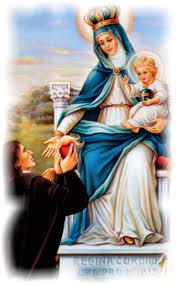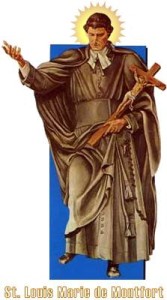From Catholic Ireland
St Louis Marie saw himself as a “slave” of Jesus Christ. He became a vagabond preacher, walking around France and was often banned by the episcopal authorities from preaching in their diocese. Fr John Murray PP tells his story.
Montfort, a Breton village
Louis Marie Grignion was born in the hamlet of Montfort, a Breton village about thirteen miles east of Rennes, on 31 January 1673. Later, as an itinerant preacher, he preferred to drop his surname and be called simply Louis Marie de Montfort, or le Pére de Montfort, the Father from Montfort. The second of eighteen children, Louis was one of the few who survived to adulthood. He was born into a family of deep Catholic faith, in an area of France renowned for its dynamic Christian life.
Jesuit education
At the age of eleven, Louis Marie set out for Rennes, the capital of Brittany, to enroll in the Jesuit College of Thomas à Becket. The young student from Montfort was considered by his teachers to be intelligent, religious, artistic in nature and somewhat shy. It was under the guidance of the Jesuits that Louis’s priestly vocation matured. The decision to enter the priesthood was made, so he tells us, at the Shrine of Our Lady in the Carmelite Church in Rennes. After eight years at the Jesuit College, Louis Marie decided to pursue his theological studies at Saint Sulpice in Paris. At the age of nineteen, a new chapter opened in his life. The young man bade farewell to family and friends at the bridge of Cess on the outskirts of Rennes.
Studies in Paris
Having left all, he crossed the Cesson bridge to a new life of total dependence upon Divine Providence. So convinced was he that God was truly his loving Father that he gave his money, baggage and clothes to the first beggars he met. Begging for food and shelter along the way, he walked to Paris, arriving in the rags of a mendicant.
For the first two years, Montfort attended classes at the Sorbonne. The following six years of theological study, however, were spent under the tutelage of the Sulpicians themselves. Like the Jesuits, they found the student from Montfort to be a talented man of deep faith, intensely studious and strongly devoted to Our Lady. He was notable for the practical love he showed for the poor, for his desire to serve the outcasts of Paris society, and for a determination to live the gospel by identifying with the most neglected.
 A man of the Bible
A man of the Bible
All his life, but especially as a seminarian, Montfort was an avid reader, and thoroughly enjoyed his task as librarian at Saint Sulpice. Above all else, he was a man of the Bible. The Sacred Scriptures were his constant companion, and his sermons and writings – five major works in all – abound with biblical texts. Louis yearned to proclaim the Good News of God’s love to the outcasts, to assure them of the love of Jesus and of the maternal care of Mary.
First Mass
At the Lady Chapel in the parish church of Saint Sulpice, Father Louis Marie Grignion celebrated his first Mass on 5 June 1700. From the age of eleven, he had completed sixteen years of formal study to reach this goal. Yet Montfort’s priestly ministry itself would last only a further sixteen years.
Unsettled
After a few years of preaching parish renewals and ministering to the destitute at the poor-house at Poitiers, Louis Mary was far from settled. He found it extremely difficult to discover how to implement his belief that God was calling him to serve the poor and to identify with them.
Meeting the Pope
His solution was simple. This unknown young priest from western France would seek the advice of the Pope. And so he set out on foot from Poitiers, begging for food and shelter along the arduous and dangerous routes to the Holy City.
In June 1706, Montfort met with Pope Clement XI (Giovanni Fancesco Albani 1700-21), pouring out his heart to the Vicar of Christ. Strangely, the Holy Father clearly saw in this young priest extraordinary gifts of God. He turned down Louis Marie’s offer to proclaim the gospel in the wilds of Canada or in the Far East. Rather, the Pope named him Apostolic Missionary, telling him to return to his native land and renew the Church there.
He spent the rest of his life conducting approximately two hundred missions and retreats throughout the villages and towns of western France, proclaiming the gospel of God’s love with Spirit-filled power.
 Mixed reaction
Mixed reaction
De Montfort’s bold, charismatic proclamation of God’s love was heard in churches, barracks, poor-houses, and even in houses of prostitution. His preaching was a source of admiration for many, of resentment and, sadly, anger for others.
His life-style as a poor, vagabond preacher, with a knapsack strung across his shoulder to carry his Bible, breviary and notebooks, was not considered dignified for a cleric. Several times the episcopal authorities forbade him to preach in one diocese or another. Always obedient, Montfort would move on.
Identified with the poor
With utter disdain for human respect, this saintly man identified with the poor, and found his greatest joy in opening for them the Word of God and offering them whatever material help he could locate. Typical of his actions was the event recorded in Dinan – probably one of many similar acts on his part – when the missionary tenderly embraced a dying, leprous beggar lying in the street, and carried him to a nearby religious house, crying out to the doorkeeper: ‘Open up to Jesus Christ!’
To the majority of the people, Father Louis Marie was simply the Good Father from Montfort. At times he was named the Father with the Big Rosary, for he ordinarily had a large rosary attached to the cord-like belt of his cassock.
Attracting thousands
His preaching, flowing from his own experience of God’s love and Mary’s maternal care, attracted thousands back to the faith. In a Jansenistic age which harshly stressed the distance between God and his people, he recommended even daily communion, a tender devotion to the Mother of God, and a total surrender to Jesus in Mary.
Undeterred
Because of the style and contents of his preaching, this Elijah-like prophet was regarded by quite a few as no more than a strange misfit. He was poisoned on one occasion and, although it did not prove fatal, it caused his health to deteriorate even more rapidly. Other attempts were made on his life, yet Montfort was not deterred.
‘Slaves of Jesus Christ’
His writings call for a loving, formal acceptance of who we truly are: the slaves of Jesus Christ. The term ‘slave’ always had, for Montfort, the evangelical connotation that we belong to the Lord, that we are loved by him, and that we are redeemed by the Incarnation and total offering of the Incarnate Wisdom for us.

No comments:
Post a Comment
Comments are subject to deletion if they are not germane. I have no problem with a bit of colourful language, but blasphemy or depraved profanity will not be allowed. Attacks on the Catholic Faith will not be tolerated. Comments will be deleted that are republican (Yanks! Note the lower case 'r'!), attacks on the legitimacy of Pope Leo XIV as the Vicar of Christ, the legitimacy of the House of Windsor or of the claims of the Elder Line of the House of France, or attacks on the legitimacy of any of the currently ruling Houses of Europe.